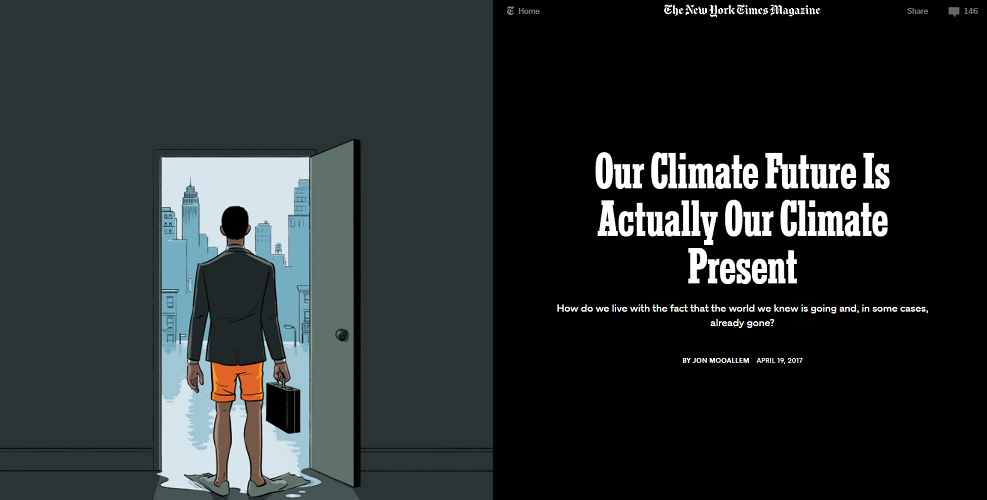The piece was published earlier this year. However, writing a post about it on the Sea Around Us blog became a timely issue in the past days, given all the extreme weather events that have recently taken place across the world, from the devastation in Puerto Rico caused by hurricane María to the severe drought that has left millions of Ethiopians in need of emergency food assistance.
“The Deluge” is the title in the print version of The New York Times Magazine; “Our climate future is our climate present” is the heading of the online version. In both cases, writer Jon Mooallem opens his article with the same question: “How do we live with the fact that the world we knew is going and, in some cases, already gone?”
In some 2,300 words, Mooallem presents a variety of examples of how people get used to changes in their natural environment caused by the so-called “progress” and how new generations cannot even tell nor imagine how things used to be before the air was loaded with tonnes of particulate matter, before entire island-countries began sinking, or before droughts started causing exodus and subsequent conflicts.
Despite the “getting used” to these transformations, older generations -those who have an idea of how things were before- feel some sort of homesickness while still being at home. This remembrance of a time when breathing was easier and swimming didn’t involve stroking through plastic bags is called “solastalgia,” Mooallem found.
In his research, the writer also bumped into the opposite phenomenon, that is, what happens with younger people who have not experienced a world where human activities have not affected, for worse, every single ecosystem.
His conclusion is that they just don’t know things were –and could have been- better. The almost infinite repository of information that is the World Wide Web can give them an idea but –Mooallem says- it would never be the same as actually having experienced it. In exploring this notion, he touches upon Daniel Pauly’s “shifting baseline syndrome.”
The theory was initially applied to the fisheries realm; however, its scope reaches far beyond this area of knowledge. The reporter summarizes: “A University of British Columbia fisheries scientist, Daniel Pauly, hit upon essentially the same idea around the same time [as psychologist Peter Kahn, also cited in the piece], recognizing that as populations of large fish collapsed, humanity had gone on obliviously fishing slightly smaller species. One result, Pauly wrote, was a ‘creeping disappearance’ of overall fish stocks behind ever-changing and ‘inappropriate reference points.’ He called this impaired vision “shifting baseline syndrome’.”
Further in the article, Mooallem expands: “Adapting to avoid or cope with the suffering wrought by climate change might gradually create other suffering. And because of environmental generational amnesia, we might never fully recognize its extent.”
The full story can be accessed here.



